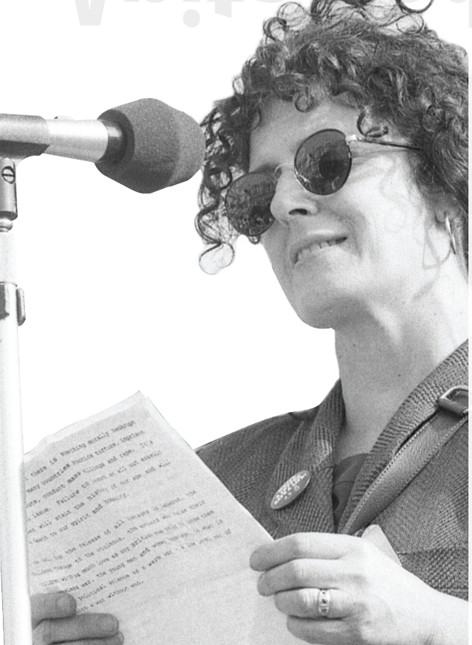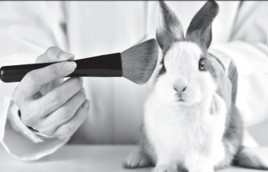
Think about the following questions.
1. Do you have favorite brands of cosmetics or skin care products?
2. Do you think animal testing is OK? If so, when is it OK?
3. Do you try to buy products from companies that are "green"?
VOCABULARY PREVIEW
Match each New Academic Word List(NAWL) word with the correct definition.
- ideology
- container _____
- hepatitis _____
- ritual _____
- necessity _____
- selective _____
- a. something that you must have or do; something that is necessary
- b. a serious disease of the liver
- c. an object such as a box or jar that can hold something
- d. careful to choose only the best
- e. the set of ideas and beliefs of a group or political party
- f. an act or series of acts done in a particular situation and in the same way each time
ANITA RODDICK

Anita Roddick was born Anita Lucia Perilli in an English bomb shelter on October 23, 1942, during World War II. Anita's parents and her three siblings had fled from Italy just before the war began. Her mother ran a café, and Anita helped her after school and on weekends. After college, Anita taught briefly at a secondary school. She soon quit, however, and traveled to places such as Australia, South Africa, and Tahiti. In 1970, she married a poet named Gordon Roddick. The couple opened a restaurant and then a hotel, and they had two daughters together, Justine and Samantha.
In 1976, Gordon decided to fulfill1 a dream—he was going to ride a horse from South America to North America. Anita needed money while he was away, so she opened a small cosmetics store called The Body Shop. Roddick later wrote on her website that it wasn't just economic necessity that inspired2 her to open the store. She was also influenced by the cultures she had experienced in her travels, especially women's "body rituals" that used natural ingredients. And she remembered the hatred3 of waste that her mother had taught her as a child. "Why waste a container when you can refill it? And why buy more of something than you can use? The Body Shop's environmental activism was born out of ideas like these."
Roddick's first store offered only fifteen products, but in time, this number would grow to more than 300. Roddick was selective about the types of products her stores carried. Most cosmetics sold at that time were tested on animals, and some animals were killed to produce beauty products. Roddick said she refused to sell products that harmed animals or ones that damaged the environment. She recycled all her bottles, used recycled items in the store, and promoted the idea of fair trade with developing countries. Roddick believed that consumers should support businesses that are run ethically4. This ideology was called "ethical consumerism" and was an early form of the modern green movement.
As The Body Shop grew, Roddick became an activist for many causes5, including protecting the rain forests, helping poor farmers, saving whales, and working to end sex discrimination. In 1990, she founded Children on the Edge, a charity6 that helps orphans7 in Europe and Asia. She also helped establish a magazine called The Big Issue, which was produced and sold by homeless people. Her volunteer work earned Roddick many awards and honors. In 2003, the Queen of England appointed her a Dame of the British Empire8.
In 2005, Roddick announced that she was going to sell The Body Shop and give away her fortune, estimated to be more than $100 million. A year earlier, she had been diagnosed with hepatitis C, which she had caught from a blood transfusion9 years before. During the last three years of her life, she campaigned to raise public awareness of the disease. Roddick died of a brain hemorrhage10 on September 10, 2007, at the age of sixty-four. She did not leave any of her money to her daughters; instead, she gave it all to charity. Roddick's greatest creation lives on, however. The Body Shop is now owned by Natura, a Brazilian company known for its ethical practices. The company operates three thousand Body Shop stores in over seventy countries.
New Academic Word List
- fulfill 1 : v. to succeed in achieving; to make true or real
- inspire 2 : v. to give someone an idea about what to do or create
- hatred 3 : n. a very strong feeling of dislike; hate
- ethically 4 : adv. in a way that is right and good
- cause 5 : n. a belief, idea, or goal that a group of people support or fight for
- charity 6 : n. an organization that helps people in need
- orphan 7 : n. a child whose parents are dead
- Dame of the British Empire 8 : n. an honorary title granted by the British monarch to a woman for service and accomplishments
- blood transfusion 9 : n. a medical treatment in which someone's blood is put into the body of another person
- hemorrhage 10 : n. uncontrolled bleeding
READING COMPREHENSION
A ‣ Mark each statement as true (T) or false (F) according to the reading.
- "Roddick" is not the last name Anita was born with.
- True
- False
- Her husband's dream was to open an eco-friendly cosmetics store.
- True
- False
- Her mother taught her not to be wasteful.
- True
- False
- Roddick first became ill in 2007.
- True
- False
- When she died, she gave her money to her children and charity organizations.
- True
- False
B ‣ Choose the best answer according to the reading.
- What is the main idea of the reading?
- a. Anita Roddick was the first woman from the UK to found a cosmetics company.
- b. Anita Roddick spent her life building an eco-friendly business and helping others.
- c. Anita Roddick earned a lot of money during her lifetime and then gave it away.
- d. Anita Roddick is an example for women to fight for their rights.
- Which is NOT mentioned as an idea that Roddick believed in?
- a. Cosmetics should be made from natural ingredients.
- b. Businesses should give up their profits to remain ethical.
- c. Products should not be tested on animals.
- d. There should be fair trade with developing countries.
- What can we infer from paragraph 3?
- a. Most people accepted animal testing in the 1970s.
- b. Most stores used recycled items in the 1970s.
- c. The Body Shop's products are mostly made in developing countries.
- d. Roddick did not expect The Body Shop to make money.
- What cause did Roddick campaign for in the last three years of her life?
- a. Working to end sex discrimination
- b. Helping orphaned children in Asia and Africa
- c. Raising awareness about hepatitis C
- d. Saving the whales
C ‣ Look for the answers in the reading and write them on the lines.
- What is the main belief of "ethical consumerism"?
_____ - What is The Big Issue?
_____
SUMMARY
Fill in the blanks with the phrases in the box.
- dislike of waste
- cosmetics store
- a bomb shelter
- to charity
- environmental and social
- recycled containers
Anita Perilli was born in 1 _____ in England during World War II. She later married a poet named Gordon Roddick and had two daughters. In 1976, Anita Roddick decided to open a(n) 2 _____ called The Body Shop while her husband was away on a long trip. She was influenced by her knowledge of body rituals in other cultures and by her 3 _____. Believing in "ethical consumerism," Roddick used pure ingredients, 4 _____, and no animal testing. Roddick was active in many 5 _____ causes and won many honors. She died in 2007 and left her large fortune 6 _____. The Body Shop continues to sell ethical products all over the world.
VOCABULARY PRACTICE
Fill in the blanks with the words in the box. Change the form if necessary.
- necessity
- ritual
- selective
- hepatitis
- container
- ideology
- I'm only taking the 7:00 a.m. class out of _____ -it's a required course and all the others were full.
- You can keep the cookies in this plastic _____ to keep them fresh.
- After years of suffering from _____ , the patient finally received a liver transplant.
- People make voting decisions based on the candidates' personal qualities as well as their _____ .
- Parents should, of course, be very _____ when hiring a babysitter.
- The Japanese tea ceremony is a long and elegant _____ .
SUPPLEMENTAL READING
Is "Green" a Myth?

The word "green" has become the usual way of indicating that something is good for the environment. Customers are looking for green products, meaning ones that are natural, pure, and made from recycled materials. They feel good about helping the Earth and about buying food and cosmetics that are healthier for their bodies. Anita Roddick sensed this when she founded The Body Shop in 1976. She advertised cosmetics that were "one hundred percent pure" and boasted that The Body Shop's products were not tested on animals. Also, she said The Body Shop did not take unfair advantage of the workers in poor countries.
For some people, this sounded too good to be true. In 1994, reporter Jon Entine wrote a famous magazine article disputing Roddick's claims. He said that The Body Shop's cosmetics were not as pure as Roddick claimed and that most of the ingredients in its products were, indeed, tested on animals. The company fought back against the accusations, but it did change the phrase on its cosmetic labels. Instead of "not tested on animals,” the phrase became “against animal testing." Later, other critics joined in. The London chapter of Greenpeace accused The Body Shop of exploiting poor workers.
Today, many other “green” companies face similar criticism. Are products that are marketed as "green" really good for the environment, or do producers simply claim that they are so they can make more money? It's a tough question. Thanks to writers such as Entine, however, one thing is certain: people are less likely to trust the manufacturer's word.
Fill in the blanks with information from the reading.
- People like buying products that are good for both the Earth and for _____ .
- A(n) _____ named Jon Entine wrote an article saying that The Body Shop's products were not really green.
- Roddick's company was accused by Greenpeace of mistreating _____.

Leave a comment
Load more